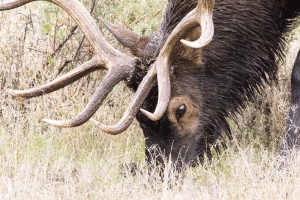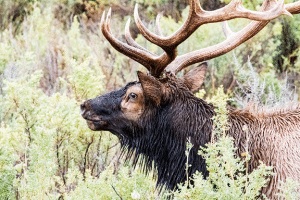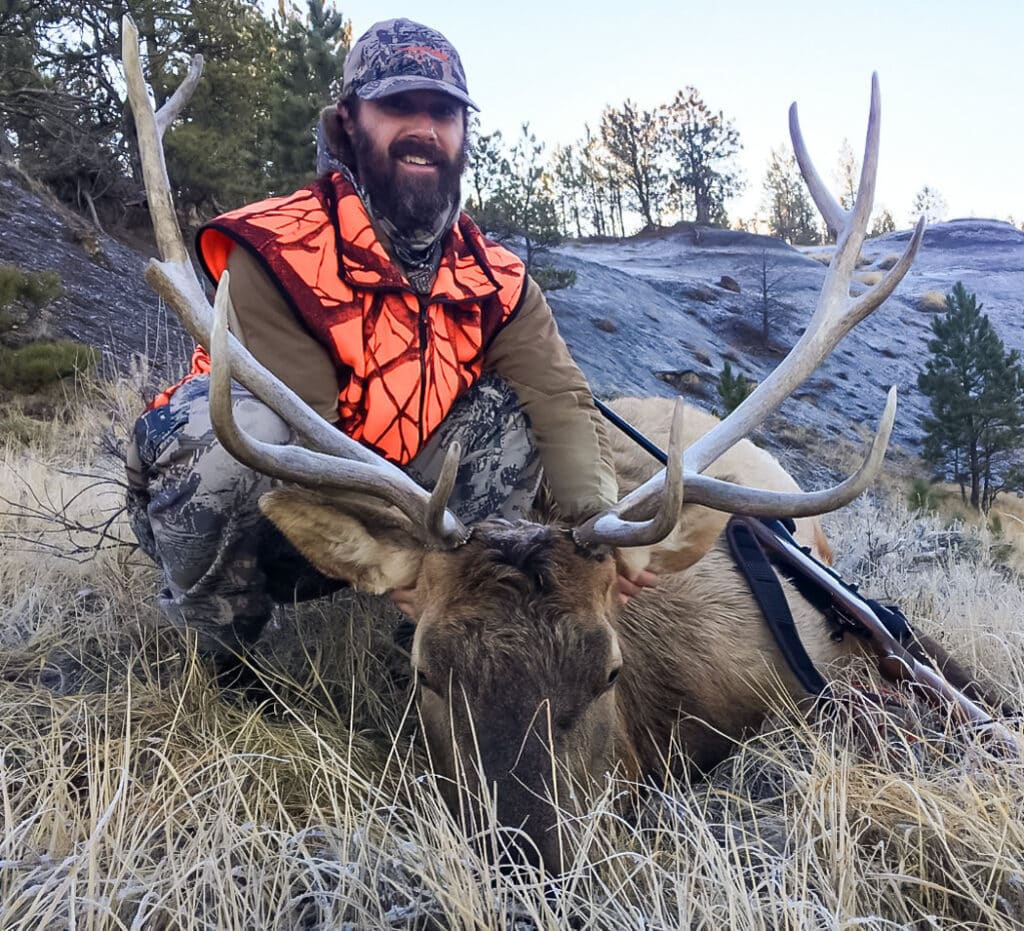
The Good: Wins for Wildlife This Session
Habitat Montana
Habitat Montana remains intact as our most important and effective conservation and access program. In contrast to previous Legislatures, Habitat Montana was left untouched in HB 5, the state capital improvement projects funding bill. Our one-on-one work with lawmakers and the strong voice of the Montana Sporting Coalition and many other conservation partners helped ensure that the program will continue to work to protect public access and wildlife habitat.
HB 265 (Rep. Kerry White, R-Bozeman) would have required state Land Board approval for conservation easements under Habitat Montana. It would have injected politics into the program, and cause uncertainty for landowners who work with the Department of Fish, Wildlife and Parks (FWP) to craft conservation easements. MWF and our conservation partners with the Montana Sporting Coalition fought this bill at every step of the way. Even though it did pass the Legislature it was vetoed by Gov. Bullock after sportsmen and sportswomen showed overwhelming opposition.
FWP Budget a Win For Sportsmen, Wildlife and Fisheries
Montana FWP comes out of 2019 with the strongest budget it has seen in over a decade. The spending authority for the agency includes investments in personnel, equipment and information technology that give the professionals within the agency the resources they need to manage wildlife, hunting and angling, habitat and to enforce our fish and wildlife protection laws. In addition, the budget fixed the issue of how the state funds wildlife law enforcement in order to ensure compliance with federal law.
State Parks Funding
SB 24 (Sen. Terry Gauthier, R-Helena) is a big win for our state parks, trails, and recreational opportunities. The bill increases the optional fee on light motor vehicle registrations from the annual $6 to $9. The fee has been in place since 2003 and this is the first increase. The bill will raise an additional $2 million for our state parks, and for trails. This bill brought together a strong, diverse coalition with leadership from the Montana Wilderness Association and motorized trail users, as well as community leaders and health care providers.
Expanding Public Access to Private Land
SB 341 (Sen. Mark Blasdel, R-Kalispell) creates grants for FWP to issue to landowners for agreements to open easements to landlocked public lands. Proposals will have to be approved by the Private Land/Public Wildlife Council, and then be approved by the FWP director. Rules will be crafted to lay out guidelines for the grants and ensure that they protect public access rights and private property rights. This bill was another example of a broad coalition coming together, including sportsmen and agricultural interests, and MWF looks forward to working with other stakeholders to develop rules to implement the new program.
Protecting Fair Chase
Montana’s ethical, fair chase hunting heritage received a boost this session with the passage of SB 349 (Sen. Jill Cohenour, D-East Helena) to ban the use of FWP specific wildlife location data to hunt or harass wildlife. It’s a big win that allows FWP to collect needed data but keeps it from being used to violate fair chase. The Legislature also approved a study resolution, SJ 30 (also by Sen. Jill Cohenour) to further look at the issue and determine if FWP can deny public release of data in order to protect wildlife.
Hunting and Fishing License System Overhaul
The complete overhaul of the aging Automated Licensing System, FWP’s system to sell hunting and fishing licenses and allow people to apply for special permits, passed in HB 10. The current system is nearly 20 years old and has not kept pace with technological changes or public demands. This needed project will allow FWP to better manage its licenses and integrate other features like game harvest reporting in conjunction.
Sage-Grouse Conservation
SB 299 (Sen. Mike Lang, R-Malta) sets into state law conservation measures to conserve sage-grouse habitat, continuing the effort started in 2015 to prevent the species from declining and needing to be listed under the federal Endangered Species Act. It includes a provision to require no net loss of sage-grouse habitat. The bill puts many aspects of the statewide Sage-Grouse Conservation Plan into law, strengthening the plan for the future.
Aquatic Invasive Species
HB 411 (Rep. Willis Curdy, D-Missoula) funds the aquatic invasive species prevention program some boat fees and a fee on hydropower generators. The program that includes boat inspections throughout the state and an education campaign was up and running from the 2017 session.
Sportsmen-Landowner Relations
A pair of bills to continue to create incentives for landowners who open their land for public hunting passed this session, both carried by Rep. Denley Loge, R-St. Regis. HB 43 allows landowners who enter into access agreements with FWP to receive a free, non-transferrable elk license for every four public hunters they allow on their land. The license can only be used by immediate family or a full-time employee of the ranch. In addition, HB 104 gives landowners who enter the Block Management program a free prerequisite license.
The Bad: Political Wildlife Management
Bills Defeated
The session saw several bills that would have politicized wildlife management and closed off public involvement.
HB 161 (Rep. Brad Tschida, R-Lolo) would have removed the requirement that the Fish and Wildlife Commission considers any public input and ignore FWP’s own social science in decision making. The bill was defeated by a strong grassroots voice from Montana hunters and from wildlife managers nationwide.
Two bills affecting bison passed this session but were vetoed by Gov. Bullock. They included HB 132 (Rep. Kenneth Holmlund, R-Miles City) which would have redefined all bison in the state as livestock and HB 332 (Rep. Joshua Kassmier, R-Ft. Benton) which would have given county commissioners a veto over professional wildlife management of bison.
MWF also worked to amend HB 497 (Rep. Wylie Galt, R-Martinsdale) to make it better. The bill would have allowed multiple cow elk B tags in districts with shoulder seasons. This would have written the shoulder seasons into state law and allowed for numerous elk per hunter. The bill was amended to give the Fish and Wildlife Commission the authority to issue one additional cow elk B tag where it deems appropriate.
HB 550 (Rep. Alan Redfield, R-Livingston) sought to redefine roads under the tax laws to remove routes that had been on them for decades. Gas tax maps are just part of the public record used to determine whether a road is a public road. The was defeated on the Senate floor 45-3 after strong opposition from hunters and public access advocates. It was supported by a handful of landowners from the east side of the Crazy Mountains.
Finally, MWF worked to amend SJ 6 (Sen. Mike Cuffe, R-Eureka). It called for the statewide removal of grizzly bears from the federal Endangered Species List, which ignored the Distinct Population Segments around the state and actually could have further delayed grizzly delisting. MWF worked with Cuffe to make the bill call for delisting in the two populations in the state that have met the criteria, and for the U.S. Fish and Wildlife Service to review and update its grizzly recovery plan.
The Ugly: Hard Fights Waged, But Unsuccessful
Several bills that had the potential to increase public access to public land failed this session, despite strong grassroots support from Montana hunters and anglers as well as support from county commissioners and county attorneys. MWF worked on these practical measures to increase public access to public lands, but they died due to backroom deals by special interests that oppose public access.
SB 224 (Sen. Tom Jacobson, D-Great Falls) would have increased the fine for illegally gating county roads to public land from the current $10 per day, to up to $500 per day. The bill was amended in committee and passed the Senate with strong bipartisan support. However, it died in the House Judiciary committee. The bill was opposed by the well-funded anti-access group the United Property Owners of Montana.
In addition, SB 301 (Sen. Jason Small, R-Busby) would have required county commission approval for anyone to put an encroachment on a county road. This would create transparency and trigger a public process. The bill passed the Senate but died in the House Judiciary committee.
As always, the 2019 Legislative Session demanded vigilance because of the large number of bills that were introduced on wildlife, hunting and fishing, and public access issues. But thanks to our dedicated, grassroots volunteers who spoke up and showed up, we did well to achieve some good outcomes. We also couldn’t have accomplished without the help we received from our conservation partner organizations through the many coalitions that MWF took part in. A broad, unified voice from advocates for wildlife, public lands, and our hunting and fishing heritage helped us stand up in the face of tough opposition. Our professional presence in the Capitol and credible expertise on wildlife issues helped build the bipartisan relationships that we needed to be successful. And none of it would have been possible without the support of thousands of MWF members who spoke up for wildlife, habitat, and access.





